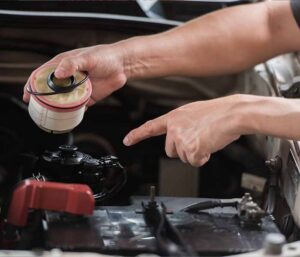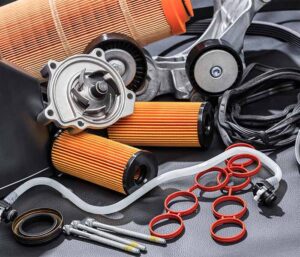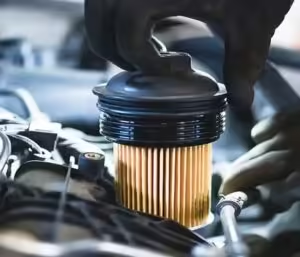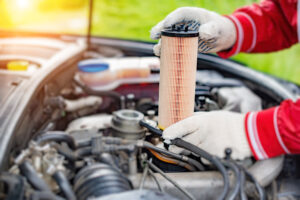The invisible key, the component that affects everything
Despite their small size, filters play a crucial role in the complex mechanical systems of modern vehicles. Efficient engine operation, clean cabin air, and a stable fuel system all depend on the silent work of air, oil, and fuel filters. Today, we’ll provide a comprehensive understanding of the types and functions of automotive filters, how to choose one, and future trends.
Main types of automotive filters
- Air Filter
The air filter filters the air entering the engine. Its primary function is to block impurities such as dust and particles, preventing them from entering the cylinders and causing wear, thereby ensuring a smooth combustion process. A high-quality air filter improves fuel efficiency and extends engine life. - Oil Filter
The oil filter removes impurities and particles, including metal powder and combustion residue, from the lubricating oil, ensuring a clean lubrication environment between the engine’s moving parts, thereby reducing wear. - Fuel Filter
The fuel filter removes impurities, water, and colloids from the fuel, preventing injector clogging and protecting the delicate components of the fuel system. The fuel filter is particularly important in diesel vehicles.
II. Three Key Criteria for High-Quality Filters
- High-Precision Filter Media
The core of a filter is its filter media. High-quality filters utilize multiple layers of high-efficiency fiber filter paper, effectively blocking particles 5μm or smaller, effectively protecting the engine from contamination. - Good Structural Sealing
A good filter features a rigorous structural design, ensuring that air, oil, or fuel can only pass through the filter media, preventing flow around seams or edges, thus preventing “short-circuiting.” - High-Temperature and Corrosion Resistance
Excellent filter materials maintain stable performance over time in harsh environments of high temperature, high humidity, and high pressure, resisting deformation, aging, and cracking.
III. How to Correctly Choose a Car Filter
- Choose by Vehicle and Engine Model
Different brands and models have different filter models. You should select the filter that matches your vehicle according to your vehicle’s manual or manufacturer’s serial number. - Prioritize Reputable Brands
It is recommended to prioritize reputable original manufacturers or brands, such as MANN, Bosch, and Shaohan. They undergo rigorous testing and are therefore more reliable. - Beware of Underpriced Products
The market is flooded with cheap, substandard imitations. These filters not only fail to protect your engine, but may actually cause damage.
IV. Recommended Vehicle Filter Replacement Cycles
- Air Filter: Replace every 10,000-15,000 kilometers.
If operating in a dusty environment, the replacement interval should be shortened.
- Oil Filter: Replace with every oil change.
Replace with the oil change to prevent contamination of the new oil by the old filter.
- Fuel Filter: Recommended replacement every 20,000-30,000 kilometers.
For diesel vehicles, more frequent replacement is recommended to prevent system corrosion caused by moisture.
V. Innovation Trends in Smart Filters
- Intelligent Monitoring Technology
Future automotive filters will be equipped with sensors to monitor parameters such as filtration performance, service life, and flow resistance changes in real time, and will remind users to replace them through the vehicle’s system or app. - Recyclable and Eco-Friendly Materials
In response to the trend of sustainable development, filter manufacturers will increasingly use biodegradable materials and promote eco-friendly designs with replaceable filter elements and reusable filter housings. - Multifunctional Integration
Combined filters integrating air purification, sterilization, and odor removal will become a trend, meeting users’ increasing demands for health and driving comfort.
Filter Market Trends and Business Opportunities
The global automotive filter market is experiencing sustained growth. According to industry research, the global filter market is projected to exceed US$25 billion by 2030, with an average annual growth rate exceeding 6%. The rise of electric vehicles is also driving a shift in filters from traditional engine protection to air quality and cabin hygiene.
For automotive parts manufacturers, cross-border e-commerce platforms, and offline repair chains, high-quality filters are a highly recurring and sticky product category, offering stable profit margins and customer loyalty.
Conclusion: Small Filters, Big Wisdom
A small automotive filter, though seemingly insignificant, carries out crucial tasks such as engine protection, fuel purification, and air cleansing. Choosing a high-quality filter not only protects the vehicle but also demonstrates the owner’s commitment to safety and performance. In the future, filters will move towards intelligent, environmentally friendly, and sophisticated development. Let us witness the evolution of this critical component together.




